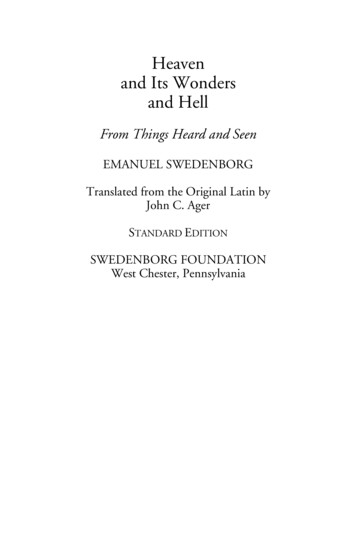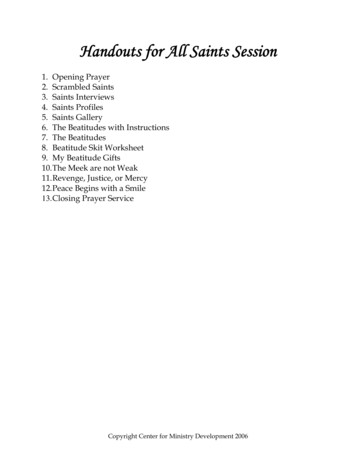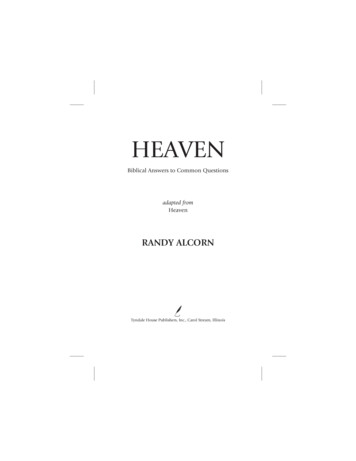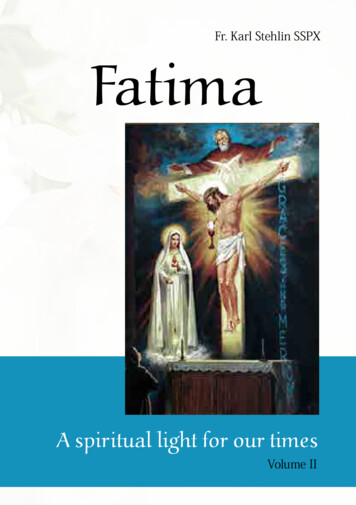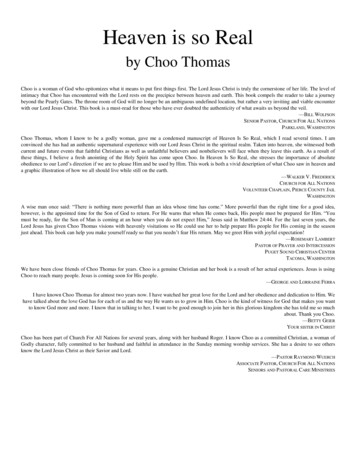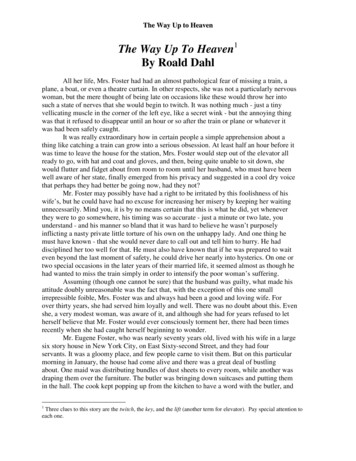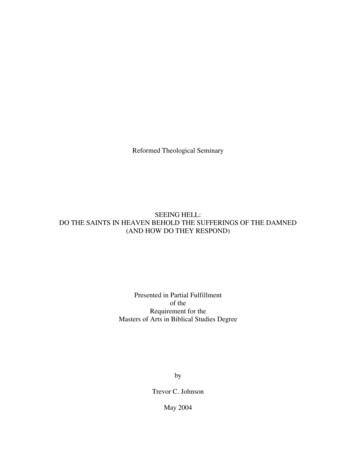
Transcription
Reformed Theological SeminarySEEING HELL:DO THE SAINTS IN HEAVEN BEHOLD THE SUFFERINGS OF THE DAMNED(AND HOW DO THEY RESPOND)Presented in Partial Fulfillmentof theRequirement for theMasters of Arts in Biblical Studies DegreebyTrevor C. JohnsonMay 2004
1TABLE OF CONTENTSINTRODUCTION . Page 2.Proposition statement . .Page 3.Section I:HISTORICAL SURVEY OF THE LITERATURE Page 6.Section II:BIBLICAL TEXTS RELATED TO THESIS . Page 32.Section III:OBJECTIONS TO THE SAINTS BEHOLDING HELL . . .Page 64.Section IV:THE PROBABILITY OF THE SAINTS BEHOLDING HELL . .Page 90.The saints are aware of those in heaven .Page 90.The saints are aware of those in hell .Page 94.This knowledge is desirable to the saints .Page 98.Section V:PRACTICAL IMPLICATIONS OF THIS DOCTRINE . .Page 107.Section VI:CONCLUSION . .Page 113.APPENDICES:Appendix A: ON THE SUFFERING OF GOD .Page 114.Appendix B: ON THE DAMNED’S GNASHING OF THEIR TEETH Page 117.Appendix C: ON THE IMPRECATIONS OF SCRIPTURE .Page 120.Appendix D: GOD IS HELL FOR THE SINNER .Page 127.Appendix E: THIS THEME IN OTHER MONOTHEISTIC RELIGIONS .Page 131.
2INTRODUCTION:The saints will gaze upon the damned in hell? They will rejoice at this sight?What a strange idea!It is this idea, however, that this thesis is concerned with. Do not dismiss this aspreposterous and cruel without at first reading on. See for yourself how the bliss and theblessings of heaven may co-exist in a universe where the wicked are perpetuallytormented, even within sight.John MacArthur describes the fellowship of heaven as “the loving family ofheaven,” where there will be “rich, unending fellowship.”1 Jonathan Edwards speaks ofheaven as a “world of love.”2 Many writers even expand upon this theme of the saints’fellowship in heaven.A vast void exists, however. Little has been written concerning the fellowship ofthe saints with those outside of heaven. Not pursued is this: the relationship that thesaints will have with the damned in hell.What is the manner of the saints’ awareness of those in hell? What manner ofcontact will these two great throngs partake of? Are the saints aware of those in hell andin what manner? Can the saints witness their sufferings and still partake of heavenlyfelicity?This thesis addresses this aspect of the eternal state. Do the righteous in heavenvisually behold hell, and if so, to what end? Can the saints visually look upon thetorments of hell; and to what effect?12John F. MacArthur, The Glories of Heaven. (Wheaton, Illinois: Crossway Books, 1996), 140.Jonathan Edwards, Heaven is a World of Love. (London: Yale University Press, 1999).
3PROPOSITION STATEMENTThis thesis will demonstrate two main truths:First:That those in heaven will, in fact, know of and probably even visually beholdthose in hell.Second:That this knowledge and sight of the condemned dead is not troubling to thesaints, but rather gives more cause for praises.STRUCTUREThis thesis will be undertaken in the following manner:First:A review of relevant historical material will be given. It will ask what the voicesof the past have spoken in regards to this topic?Second:Scripture will be applied. Historical sources are important; but incompletewithout Biblical texts as the rightful authority.Third:Roadblocks to progress will be discussed. Admittedly, this thesis sobers the mindconsiderably. Many recoil instinctually at it. Many objections instantly spring to mind.Do these objections have valid rebuttals? An entire section will determine just that.Fourth:Positive arguments will be presented for this thesis.
4Finally:The practicality of this thesis and conclusions reached will be addressed.WHY WRITE ABOUT A SUBJECT SUCH AS THIS?Why advance the idea that the saints in heaven will visually behold the damned inhell?First:It is little discussed. There appears to be a dearth of literature concerning this areaof doctrine. When writing of heaven, many tracts, sermons and systematic theologytextbooks go into length concerning the blessedness of heaven. Heaven is devoid of anytears or sorrow. The saints in heaven even have knowledge and awareness towards oneanother and this awareness is sometimes mentioned in some writer’s discourses onheaven. Details of “heavenly geography,” such as the “streets of gold” and the “pearlygates” are also mentioned, but the relationship that the saints have towards the wicked inhell is a neglected subject. Rarely is found the saints’ awareness of hell, much less theirvisual sight of the damned.This is of particular relevance in the present era. Modernists shun the doctrine ofhell, only approaching it with hesitation and pained attempts to qualify and soften theirstatements. Present day discomforts and reservations should not, however, stymielegitimate investigations into all aspects of the Christian faith.Second:That this proposition can either be seen or logically deduced from the witness ofScripture is cause enough to write about it. If it is revealed, it is legitimate to investigate.
5If explicit evidence or implicit deductions can be drawn from Scripture then they shouldbe drawn for the sake of imparting truth.Finally:This proposition is worthy to be written about due to its practicality. Many willobject. Its practicality? What earthly good does this investigation accomplish? It isdistasteful.These criticisms do not stand! If it is revealed, then it should be researched. Tostate otherwise is to conclude that God reveals for naught. Though questions ofsoteriology have prime importance, questions of eschatology and the final state areimportant as well. These bolster faith and help believers walk circumspectly and glorifyGod by diligently seeking His ways.
6SECTION I:HISTORICAL SURVEY OF THE LITERATUREThe proposition of this thesis has been put forward. The structure and practicalityof this topic has been given. Now, an historical overview of past writers concerning thisquestion.The Bible affirms: Scripture is not of private interpretation.3 Therefore, as ironsharpens iron, the voices of the past may sharpen the present community of God. Thisthesis will give heed to those voices.Catholic and Early ChurchTertullianPerson:Born around 155 A.D., Tertullian not only helped to elevate Latin as the languageof the Catholic Church, but also leveled many polemic attacks against the Gnostics.View:Of interest to this thesis are the words he wrote concerning hell. The followingconcern the sight of the wicked in hell by the saints:How vast a spectacle then bursts upon the eye! What there excites my admiration?what my derision? Which sight gives me joy? which rouses me to exultation?-as I seeso many illustrious monarchs, whose reception into the heavens was publiclyannounced, groaning now in the lowest darkness with great Jove himself, and those,too, who bore witness of their exultation; governors of provinces, too, who persecutedthe Christian name, in fires more fierce than those with which in the days of their pridethey raged against the followers of Christ.What world's wise men besides, the very philosophers, in fact, who taught theirfollowers that God had no concern in ought that is sublunary, and were wont to assure3The Protestant community may also affirm this, all the while holding to Sola Scriptura. After all,Peter affirms this.
7them that either they had no souls, or that they would never return to the bodies whichat death they had left, now covered with shame before the poor deluded ones, as onefire consumes them!Poets also, trembling not before the judgment-seat of Rhadamanthus or Minos, butof the unexpected Christ! I shall have a better opportunity then of hearing thetragedians, louder-voiced in their own calamity; of viewing the play-actors, much more"dissolute" in the dissolving flame; of looking upon the charioteer, all glowing in hischariot of fire; of beholding the wrestlers, not in their gymnasia, but tossing in the fierybillows; unless even then I shall not care to attend to such ministers of sin, in my eagerwish rather to fix a gaze insatiable on those whose fury vented itself against the Lord.4It appears that Tertullian believed that the saints would see into hell. It even appearsthat Tertullian concluded that they would rejoice over such sights (though whether thisconclusion was born out of systematic study or inflamed passions is not clear).5Augustine of HippoPerson:Augustine was one of the shining lights of the early church, greatly read by bothCatholics and the early Reformers. His Confessions (written in 397) was arguably thefirst autobiography and The City of God, written later, arguably was the first philosophyof history.4Tertullian De Spectaculus xxx.In response; Lymann Abbott et. al., 227:“Rugged old Tertullian, in whose torrid veins the fire of his African deserts seems infused,revels with infernal glee over the contemplation of the sure damnation of the heathen.”Also, Bertrand, Russel, Unpopular Essays (New York: Simon and Shuster, 1950), 149:“Consider the pleasures of Milton’s Satan when he contemplates the harm that he could doman his psychology is not so very different from that of Tertullian, exulting in the thought thathe will be able to look out from heaven at the sufferings of the damned.”5From Tertullian’s general tone it could be argued that he reached his conclusions merely throughpolemical passion and not reasoned study. Christian persecution was widespread during this time inhistory. Tertullian fails to distinguish between primary causes and secondary causes of this joy and he
8View:In his monumental work, The City of God, Augustine sets forth this description ofthe relationship between the righteous and the wicked in the eternal state:[Commenting on Isaiah 66:24] But in what way shall the good go out to see thepunishment of the wicked? Are they to leave their happy abodes by a bodily movement,and proceed to the places of punishment, so as to witness the torments of the wicked intheir bodily presence? Certainly not; but they shall go out by knowledge For those whoshall be in torment shall not know what is going on within the joy of the Lord; but theywho shall enter into that joy shall know what is going on outside in the outer darkness.Therefore it is said, "They shall go out," because they shall know what is done by thosewho are without. For if the prophets were able to know things that had not yet happened,by means of that indwelling of God in their minds, limited though it was, shall not theimmortal saints know things that have already happened, when God shall be all in all?6In this passage, Augustine denies any sight of heaven by the wicked, but he doesspeak of the saints “going out” and seeing the wicked in hell (if only by mentalapprehension and not visual sight of the eye).7 Augustine definitely affirms that the saintspossess knowledge of hell in heaven.Keenly mentioned is also the fact that if the prophets of old were able to know thesethings in limited manner; will not the immortal saints in heaven know these things oncethey have already happened? This truth will be important when discussing whether or notthe Redeemed in heaven will know that there are those in hell.appears to joy in the pain for the pain’s sake instead of the reasons annexed to it; namely the exultation ofthe righteousness of God.6Augustine, City of God, Book XX, chapter 22.
9Thomas AquinasPerson:Thomas Aquinas, born 1225-27, was a theologian, philosopher and “Doctor of theCatholic Church”. His prolific writings have formed the basis of official Roman Catholicdogma to such degree that in 1879 the Pope declared that, among all the scholasticdoctors, Aquinas was “the chief and master of all towers.”8View:The sight of the wicked and the response of the saints:Aquinas is very relevant to this thesis topic. He writes much on the LastJudgment and heaven and hell. His is a stepwise and orderly style, and in the SummaTheologica Aquinas systematically unfolds his rigid Scholastic formulae concerning therelationship of the saints in heaven to the wicked in hell:Nothing should be denied the blessed that belongs to the perfection of theirbeatitude Wherefore in order that the happiness of the saints may be more delightfulto them and that they may render more copious thanks to God for it, they are allowed tosee perfectly the sufferings of the damned.9And also, more succinctly:That the saints may enjoy their beatitude more thoroughly, and give more abundantthanks for it to God, a perfect sight of the punishment of the damned is granted them.108Pope Leo XIII, Aeterni Patris: On The Restoration of Christian Philosophy. Papal Encyclicalpromulgated on August 4, 1879. Pope Leo XIII also stated thus: “We exhort you, venerable brethren, inall earnestness to restore the golden wisdom of St. Thomas, and to spread it far and wide for the defenseand beauty of the Catholic faith, for the good of society, and for the advantage of all the sciences.”9Thomas Aquinas, The Summa Theologica, Supplementum Tertia Partis, Question 94, Article 1.10Ibid.
10In these two selections, Aquinas promulgates the major thoughts of many writers tofollow. First, the saints are aware of hell, even seeing it. And second, this sight is not acause for distress, but rejoicing. According to Aquinas, the Righteous in heaven willlook down on hell and feel joy over this view of God’s justice being vindicated. God’smercy and goodness are put on display and witnessed by the saints.For Aquinas, heaven will consist of an illumining of the mind and senses.Nothing will be denied in these blessings to the saints in regards to good things.Knowledge, even including sight, is a blessing that will not be denied to the saints.God will not make the saints ignorant of the damned. This would be a denial ofthe blessing of knowledge, a deficit even greater than the knowledge attained on earth.After all, even the saints on earth, in their lesser state of knowledge know of hell. Surelyheaven, with its greater blessings, will contain greater knowledge. The saints will possessa greater knowledge, including a greater knowledge of hell – even seeing it.Seeing the punishment of the wicked, the righteous have no pity:Whoever pities another shares somewhat in his unhappiness. But the blessed cannotshare in any unhappiness. Therefore they do not pity the afflictions of the damned.11This knowledge and sight of hell does not detract, in any way, from the joys ofheaven; rather, it even contributes to it. By this visual display of the end result ofrebellion against God the saints are allowed to “enjoy their beatitude more thoroughly.”12This sight does not ruin heaven; it enhances it.11Thomas Aquinas, The Summa Theologica, Supplementum Tertia Partis, Question 94, Article 2.
11A distinction regarding the causes of joy in this sight:Will the Redeemed in heaven be happy when they see damned souls in hell? Mostassuredly, yes. Aquinas, however, does make several distinctions. He distinguishesbetween the primary and secondary causes of this joy in beholding hell.Aquinas is careful not to emphasize that the saints will joy over the pain of theungodly for pain’s sake.13 Instead, he asserts the direct causes of joy as (1) joy overdeliverance from the ungodly and (2) joy over the vindication of divine justice.The saints only gain joy indirectly from the punishment, their direct joy beingtheir deliverance and the glorification of God’s justice in it. Aquinas writes:A thing may be a matter of rejoicing in two ways. First directly, when one rejoicesin a thing as such: and thus the saints will not rejoice in the punishment of the wicked.Secondly, indirectly, by reason namely of something annexed to it: and in this way thesaints will rejoice in the punishment of the wicked, by considering therein the order ofDivine justice and their own deliverance, which will fill them with joy. And thus theDivine justice and their own deliverance will be the direct cause of the joy of theblessed: while the punishment of the damned will cause it indirectly.141213Thomas Aquinas, The Summa Theologica, Supplementum Tertia Partis, Question 94, Article 2.A distinction that some, such as Tertullian, was not so careful to make.
12Views of Protestant Writers15Jeremy TaylorPerson:Jeremy Taylor, born in 1613, was an English Bishop of the Church of Englandwho wrote the (then) popular Holy Living and Holy Dying.View:Relevant to this study is a surviving sermon of Taylor’s that paints a graphicscene, indicating that Taylor, too, believed that the saints will visualize the torments ofhell:Husbands shall see their wives, parents shall see their children tormented beforetheir eyes the bodies of the damned shall be crowded together in hell like grapesin a wine-press, which press on another till they burst 16This selection appears to address eternal punishment and the ongoing witness of thisby the saints. Though spoken passionately, it appears that Jeremy Taylor here did notspeak solely for rhetorical effect, but was rather expressing his own views of reality.Jonathan EdwardsPerson:Jonathan Edwards, the “American Augustine,”17 wrote much on the subjects ofheaven and hell. To many, he is the epitome of the “Hellfire and brimstone” preacher. He14Summa Theologica, Question 92, Article 3.Note: Strict chronology is not followed in the sequencing of the authors; Edwards is put towardsthe front for emphasis while others, quoted less extensively, are put towards the back in general.16Jeremy Taylor Christ’s Advent to Judgment, sermon quoted in Lymann Abbot et. al., 227-8.Sermon also accessed, November 2003, hp.15
13was certainly used of God to kindle fires in the souls of many during the GreatAwakening, and his works are of particular relevance to this proposition.View:The view of Edwards is similar to that of Aquinas. The righteous will witness thetorments of hell and rejoice in their punishment.There is, however, a clearly discernible difference in the style and methodology ofeach of these writers. Whereas Aquinas addressed this in rigid Scholastic fashion,Edwards develops this in vivid and picturesque detail. But, despite their stylisticdifferences, the following quote by Edwards comes very close to the phraseology ofAquinas regarding the subject at hand:Every time they look upon the damned, it will excite in them a lively and admiringsense of the grace of God The view of the misery of the damned will double the ardorof the love and gratitude of the saints in heaven.18Like Aquinas, Jonathan Edwards affirms the visual sight of hell by the saintsand this sight is given so that the saints may, as Aquinas asserts, “enjoy theirbeatitude more thoroughly, and give more abundant thanks for it to God”.19A persistent theme in the corpus of Edwards’ writings is that “God has created thewhole world for his own glory; therefore he will glorify himself exceedingtranscendently.”20 All of creation is but a means for God’s own pleasure and glory. Eventhe disposition of all mankind:17H. Richard Niebuhr, “The Anachronism of Jonathan Edwards.” Address given in Northampton,Massachusetts on March 9, 1958, the bicentennial of the death of Jonathan Edwards.18Jonathan Edwards, “The Eternity of Hell Torments,” The Wrath of Almighty God. (Morgan,PA: Soli Deo Gloria Publications, 1996), 356-7.19Aquinas, question 94, Article 1. Note the striking similarity to Edwards.20Jonathan Edwards, “Miscellanies #106, Happiness,” The Jonathan Edwards Reader. (London:Yale University Press, 1995), 40.
14The glory of God is the greatest good. It is that which is the chief end of the creation. Itis of greater importance than anything else. But this one way wherein God will glorifyhimself, as in the eternal destruction of ungodly men, he will glorify his justice. Thereinhe will appear as a just governor of the world. The vindictive justice of God will appearstrict, exact, awful, and terrible, and therefore glorious.21After the Last Judgment, both the righteous and the wicked will glorify God: onein his mercy, the other in his justice. In these two opposite fates of mankind the entiretyof God’s holy attributes are put on display for the whole universe:22It will be an occasion of their rejoicing, as the glory of God will appear in it. Theglory of God appears in all his works: and therefore there is no work of God which thesaints in glory shall behold and contemplate but what will be an occasion of rejoicing tothem. God glorifies himself in the eternal damnation of the ungodly men. God glorifieshimself in all that he doth; but he glorifies himself principally in his eternal disposal ofhis intelligent creatures: some are appointed to everlasting life, and others left toeverlasting death.23Style and distinctions between the causes of this joy for saints:The style of Jonathan Edwards is much more vivid than the logical progression ofAquinas. Due to this manner of vivid portrayal of hell, it has been charged that Edwardswas excessively harsh.The following is characteristic of Edwards’ style: 24When they [the saints in heaven] shall see the smoke of their torment [the damned],and the raging of the flames of their burning, and hear their dolorous shrieks and cries,and consider that they in the meantime are in the most blissful state, and shall surely bein it to all eternity; how will they rejoice!2521Jonathan Edwards, “The Eternity of Hell Torments,” The Wrath of Almighty God. (Morgan,PA: Soli Deo Gloria Publications, 1996), 356-7.22This echoes Aquinas’ comments concerning how God is glorified the more, “when contrariesare placed beside each other.” (Summa Theologica, Question 94, Article 1).23Jonathan Edwards, “The End of the Wicked Contemplated by the Righteous,” The Wrath ofAlmighty God. (Morgan, PA: Soli Deo Gloria, 1996), 373.24Largely due to the differing reasons for their writings, Edwards crafted sermons in order tomove sinners to Christ and warn them vividly, while Aquinas was attempting a comprehensive study of theChristian faith in the manner of the Scholastics.The 6th grade history book taught to this writer, on covering the Great Awakening, stated thatEdwards tried to “scare people into heaven”, and illustrated this by the famous “spider over a pit” analogyto prove this point. Edwards was made to appear a zealous fanatic.25Edwards, 373.
15Despite stylistic differences, Edwards and Aquinas are both careful to elucidatethe distinction between the direct and the indirect causes of joy in the saints’ sight of hell:And whereas the heavenly inhabitants are in the text [Revelation 18, concerning the fallof Babylon] called upon to rejoice over Babylon, because God had avenged them onher; it is not to be understood that they are to rejoice in having their revenge glutted, butto rejoice in seeing the justice of God executed, and in seeing his love to them inexecuting it on his enemies.26The reciprocity of this sight (the damned shall see heaven):Edwards differs with Aquinas on a closely related issue: the sight that the wicked willpossess. Both state explicitly that the saints will visually behold hell and rejoice. Edwardsstates as well that, not only will the saints see hell, the damned shall see heaven.Catholics writers, for the most part, have stated that the wicked will not see anythingregarding heaven after the Last Judgment and will be confined to a very limited sight oftheir own torments in a black and lonely environment.27Thomas Aquinas:The damned, before the judgment day, will see the blessed in glory, in such away as to know, not what the glory is like, but only that they are in a state of glory thatsurpasses all thought. This will trouble them, both because they will, through envy,grieve for their happiness, and because they have forfeited that glory. Hence it is written(wis. V. 2) concerning the wicked: Seeing it they shall be troubled with terrible fear.After the judgment day, however, they will be altogether deprived of seeing the blessed:nor will this lessen their punishment, but will increase it; because they will bear inremembrance the glory of the blessed which they saw at or before the judgment: andthis will torment them. Moreover they will be tormented by finding themselves deemedunworthy even to see the glory which the saints merit to have [underlines added]. 2826Jonathan Edwards, “The End of the Wicked Contemplated,” The Wrath of Almighty God.(Morgan, PA: Soli Deo Gloria Publications, 1996), 376. Information in brackets added.
16Note also the words of Peter Lombard:Both the good shall see the wicked and the wicked the good until the judgment.After the judgment the good will indeed see the wicked but not the wicked thegood The elect will behold the torture of the impious and as they see them they willnot grieve. Their minds will be sated with joy as they gaze on the unspeakable anguishof the impious, returning thanks for their own freedom.29Alphonsus Liguori echoes the same:You will see the elect triumph and exult with joy on their entrance into heaven, andyourself banished, like an unclean animal, from that blessed country, deprived foreverof seeing the face of an infinitely amiable God, and separated from the company ofMary, of the angels and the saints. 30The damned will never see the blessed vision of heaven these writers assert. Edwardsand many Puritans, however, “opened the eyes” of the wicked. They insisted that thedamned, too, may see the “other side”. The wicked may see heaven and mourn its loss31:We know not how far the two worlds, the world of happiness and the world ofmisery, may be within each other’s view. It seems as though the glorified in heavenshould some way or other have an apprehension of the damned in hell and also thedamned an apprehension of the glory of the saints in heaven as though they had a viewof each other’s state.3228Aquinas Summa Theologica, Supplementum Tertia Partis, Question 98, Article 9.Also, note Peter Lombard Sent. Lib. Iv., quoted in Lyman Abbott, et. al., That UnknownCountry (Springfield, Massachusetts: C.A. Nichols & Co., Publishers, 1888), 48.30Alphonsus Liguori, “Meditation on Hell: paragraph 3,” November 2003,http://wwww.endofman.com (n.d.).31Albeit, they will see heaven and mourn with an unregenerate nature that still hates God. Theydesire heaven for its bliss and its escape from suffering, not due to the fellowship of the saints, andespecially, not God.32John H. Gerstner, Jonathan Edwards on Heaven and Hell (Morgan, Pennsylvania: Soli DeoGloria Publishers, 1980), 71.29
17Samuel HopkinsPerson:This student of Jonathan Edwards (1721-1803) expanded on the theologyof Edwards and continued many of his main themes.View:Not surprisingly, Hopkins echoes the belief of Edwards that the spectacleof eternal torment will be a source of delight to the saints:It has already been observed and shown how well suited and necessary endlesspunishment is, to make a full and most glorious display of the divine character, in theview of the blessed The smoke of their torment shall ascend in the sight of the blessedforever and ever, and serve as a most clear glass, always before their eyes, to give thema constant bright and most affecting view of all these. And all this display of the divinecharacter and glory will be in favor of the redeemed, and most entertaining, and givethe highest pleasure to all who love God, and raise their happiness to ineffable heights,whose felicity consists summarily in the knowledge and enjoyment of God.33Reverend Nathaniel EmmonsPerson:Reverend Nathaniel Emmons was a Congregational pastor from New England(1745 to 1840).View:This quote is very direct and clear as to his convictions:The happiness of the elect will consist in part of witnessing the torments of thedamned in hell, among whom may be their own children, parents, husbands,33Samuel Hopkins Works (p. 459), quoted in Lymann Abbott, et. al., That Unknown Country(Springfield Massachussetts: C.A. Nichols & Co., Publishers, 1888), 56. Note also this theme: The sight ofhell is given to the saints as a gift of God to His saints, to show them Himself more fully.
18wives and friends; . but instead of taking the part of their miserable being, theywill say 'Amen!', 'Hallelujah!', 'Praise the Lord!'34John GillPerson:Born in the closing years of the 1600’s, Gill is known for his systematic treatmentof doctrine and his commentary on the Scriptures.View:It appears that Gill agrees with Edwards’ view that the torments of the wickedwill be done in full view of God, the angels and men:Of the company of angels and saints: they will be tormented in the presence ofthe angels, without receiving any benefit by them, or relief from them: they will besensible of the happiness of the saints, which will aggravate their misery; they will notbe able to come at them, and share with them in their bliss; nor have the least degree ofconsolation from them; the rich man saw Lazarus in the bosom of Abraham, but couldnot obtain one dip of the tip of his finger in water to cool his tongue yea, they will nothave the least pity shown them by God, angels or men; God will mock at theirdestruction; angels will applaud his righteous judgment; and the holy apostles andprophets, and all the saints, will rejoice over them, as they will over Babylon, and at herdestruction, because of the justice of God being glorified by it.35Gill, like these past authors, states that the saints will see hell and glory in thisexpression of God’s justice. Gill also seems to hold the reciprocal view, writing that thedamned “will be sensible of the happiness of the saints, which will aggravate theirmisery.”36 For many theologians (including Gill) the “Wall” between heaven and hell istransparent and this “great gulf fixed” is such that each side can see the other.34Nahigian, Kenneth, “How I walked Away”, December 2003, www.infidels.
DO THE SAINTS IN HEAVEN BEHOLD THE SUFFERINGS OF THE DAMNED (AND HOW DO THEY RESPOND) . (Wheaton, Illinois: Crossway Books, 1996), 140. 2 Jonathan Edwards, Heaven is a World of Love. (London: Yale University Press, 1999). 3 . of the Catholic Church, bu
